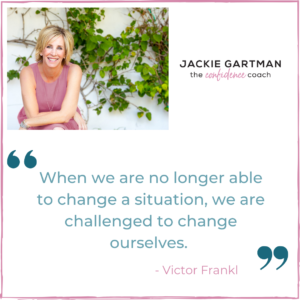
Lately, I’ve been noticing a lot of should and ought-tos and have-tos coming from my friends and clients. I’ve even overheard them from strangers at the supermarket. They sound something like this:
My friend needs to just get over her ex already . . . my brother should relax more . . . my father needs to mind his own business . . . my daughter ought to dump that jerky boyfriend of hers . . . my kid has to study harder . . . my boss is too demanding.
The subcontext? If only everyone would behave the way they SHOULD, I would be more content, more peaceful, secure, confidant, joyful, and maybe even thinner!
Yeah. That sounds right.
When we allow our minds to run this negative loop, we act out a compulsion to fix, advise or rescue whoever it is that we are shoulding all over. Rather than exploring the thoughts and fears that create this discomfort for us, we blame others for those negative feelings.
And we often don’t even know that we’re doing it.
Here’s how this played out for Donna (all names have been changed):
Donna’s son, Scott, had always slept through his alarm, so Donna had gotten into the habit of waking him every morning. When he went off to college, she continued this routine, calling him every single day to make sure he got up on time. Donna was worried for Scott. She was afraid that he would miss classes and fail, and her story, of course, was that he “should” go to classes and succeed. The thing is, her well-intentioned interference was keeping her son from learning how to take care of himself.
Interestingly, this happened with my own son. We used to wake him every morning while he lived at home. But when he went off to college, not only did he miss an entire class his first day, he also, later in the semester, slept through a final and failed the class.
Guess what? He was never late again.
When we step in with our shoulds about others’ choices and actions due to our own discomfort we rob them of free will and the very experiences they NEED to grow and evolve. It may seem like a selfless act, but it’s actually the opposite: in this case, my client had such a high degree of judgment and discomfort over the prospect of her son failing, she took something vital from him in her need to control his outcome.
We don’t grow and evolve from our successes, but rather from our mistakes. When we allow our “shoulds” to rob others of the chance to make mistakes, we make ourselves miserable and we don’t allow them the opportunity to grow.
Bottom line, if your happiness or peace depends on anyone in your life needing to behave in a certain way (usually your way), that makes them your hostage. Don’t get caught in the trap of waiting for someone else to make you happy, whole, secure, confident or joyful.
Just like Donna, your kid making it to class on time, or getting into his dream school if only he would study harder, will not, in the long run, make you a happier person. Really, it won’t!
Even if you get the behavior you think you want, that thing that will make you so happy and possibly wealthy and wise, it’s likely your mind will simply move onto to someone or something else that is not within your control.
Your feelings are YOURS, and regulating them is an inside job.
Don’t allow the behavior of another, good or bad, deprive you of the power, clarity or joy that resides within you. Be the model for them—and for yourself—that your happiness is under your own control and not dependent on what someone else “should” or “shouldn’t” do.
Best yet? When you let others to take care of themselves (or not—it really is THEIR choice), it is ultimately a relief for not just you—but them.
Take your foot off the gas pedal, and find the peace in release and allowing.
Hey, without all that comfort eating (or drinking) you’ve been doing while you worry about what everyone else in the world “should” be doing, you might even lose a few pounds of anxiety, frustration and fear.

Making Meaning in Hard Times
I had to forego my hike today. It’s not a big deal, and yet it is. Hiking has been one



